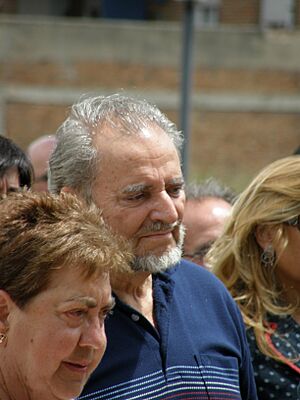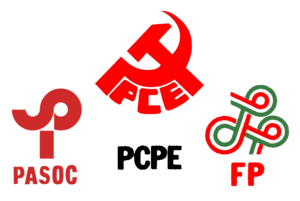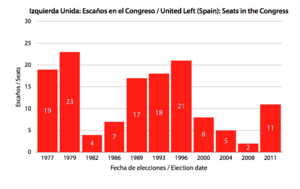United Left (Spain) facts for kids
Quick facts for kids <div style="padding-top:0.3em; padding-bottom:0.3em; border-top:2px solid Lua error in Module:European_and_national_party_data/config at line 227: attempt to index field 'data' (a nil value).; border-bottom:2px solid Lua error in Module:European_and_national_party_data/config at line 227: attempt to index field 'data' (a nil value).; line-height: 1;">
United Left
Izquierda Unida
|
|
|---|---|
 |
|
| General Coordinator | Antonio Maíllo |
| Founded | April 1986 (as coalition) 2 November 1992 (as party federation) |
| Youth wing | Área de Juventud de Izquierda Unida |
| LGBT wing | ALEAS |
| Membership (2023) | |
| Ideology | Communism Socialism Republicanism |
| Political position | Left-wing to far-left |
| National affiliation | The Left (2009–2014) Plural Left (2011–2015) Plural Left (2014–2019) Popular Unity (2015–2016) Unidas Podemos (2016–2023) Sumar (since 2023) |
| European affiliation | Party of the European Left |
| International affiliation | IMCWP |
| Colours | Red |
| Congress of Deputies | Lua error in Module:European_and_national_party_data/config at line 227: attempt to index field 'data' (a nil value). |
| Spanish Senate | Lua error in Module:European_and_national_party_data/config at line 227: attempt to index field 'data' (a nil value). |
| European Parliament | Lua error in Module:European_and_national_party_data/config at line 227: attempt to index field 'data' (a nil value). |
| Regional Parliaments |
10 / 1,268
|
| Local Government |
1,678 / 67,515
|
| Website | |
| Lua error in Module:European_and_national_party_data/config at line 227: attempt to index field 'data' (a nil value). | |
United Left (known as Izquierda Unida or IU in Spanish) is a political group in Spain. It started in 1986 as a coalition, which means a group of different political organizations working together. These groups were mostly connected to the Communist Party of Spain.
IU was first formed by seven different parties. Today, the Communist Party of Spain (PCE) is the main member at the national level. However, IU also includes other regional parties, political groups, and independent members. It now acts like a permanent group of parties working together.
Between 2016 and 2023, IU was part of the Unidas Podemos coalition. This group had members in the Congreso de los Diputados, which is like Spain's main parliament. In January 2020, IU joined a national government for the first time, with one minister. For the 2023 Spanish general election, IU joined the Sumar group.
Contents
History of United Left

After a difficult election in 1982, leaders of the Communist Party of Spain (PCE) felt they needed to work with other left-wing groups. They wanted to form a bigger group to challenge the Spanish Socialist Workers' Party (PSOE).
IU slowly got better results in elections. In 1989, they received about 9% of the votes. By 1996, they reached almost 11% of the votes. The first groups that formed IU included the Communist Party of Spain, Progressive Federation, and Republican Left.
At first, IU had a strong approach against the PSOE. They often saw the PSOE as similar to the People's Party (PP). However, after some less successful elections in 1999, IU decided to work more with the PSOE. They agreed to an election plan with the PSOE in 2000. They also decided to cooperate with the PSOE in local governments.
United Left currently has about 18,000 members. This number is lower than in 2012, when they had around 70,000 members.
How United Left is Organized
Member Parties of IU
United Left is made up of several political parties and organizations. Some groups have joined and left over the years.
| Party | Notes | |
|---|---|---|
| Communist Party of Spain (PCE) | ||
| La Aurora Marxist Organization (La Aurora (OM)) | Not a political party. Joined in 1998. | |
| Republican Left (IR) | Left in 2002, rejoined in 2011. | |
| Unitarian Candidacy of Workers (CUT) | Left in 2015, rejoined in 2018. | |
| Former Members | ||
| Feminist Party of Spain (PFE) | Joined in October 2015, left in February 2020. | |
| Humanist Party (PH) | Member from April to July 1986. | |
| Carlist Party (PC) | Left in 1987. | |
| Progressive Federation (FP) | Left in December 1987. | |
| Communist Party of the Peoples of Spain (PCPE) | Left in 1988. | |
| Socialist Action Party (PASOC) | Left in 2001. | |
| Red Current (CR) | Joined in 2002, left in 2004. | |
| Anti-capitalists (IA) | Joined in 1995, left in 2008. | |
| Coalition for Melilla (CpM) | Joined in 2008, left in 2013. | |
| Open Left (IzAb) | Joined in 2012, left in 2018. | |
Leaders of United Left
The United Left has had several leaders over the years. They are called "Federal Coordinators."
| Name | Period |
|---|---|
| Gerardo Iglesias | 1986-1989 |
| Julio Anguita | 1989–1999 |
| Francisco Frutos | 1999–2001 |
| Gaspar Llamazares | 2001–2008 |
| Cayo Lara | 2008–2016 |
| Alberto Garzón | 2016–2023 |
| Antonio Maíllo | 2024–present |
Regional Branches of IU
United Left has different branches in various regions of Spain. These are called "Territorial Federations."
- Andalusia: Izquierda Unida Los Verdes - Convocatoría por Andalucía
- Aragon: Izquierda Unida Aragón
- Asturias: Izquierda Xunida de Asturies
- Balearic Islands: Esquerra Unida de les Illes Balears
- Canary Islands: Izquierda Unida Canaria
- Cantabria: Izquierda Unida de Cantabria
- Castilla-La Mancha: Izquierda Unida de Castilla-La Mancha
- Catalonia: Esquerra Unida Catalunya (Founded in July 2019)
- Castilla y León: Izquierda Unida de Castilla y León
- Ceuta: Izquierda Unida de Ceuta
- Euskadi: Izquierda Unida - Los Verdes: Ezker Anitza
- Extremadura: Izquierda Unida Extremadura
- Galicia: Esquerda Unida
- La Rioja: Izquierda Unida La Rioja
- Madrid: Izquierda Unida-Madrid (A new group created in 2016)
- Melilla: Izquierda Unida - Federación de Melilla
- Murcia: Izquierda Unida-Verdes de la Región de Murcia
- Navarra: Izquierda Unida de Navarra - Nafarroako Ezker Batua
- Valencian Community: Esquerra Unida del País Valencià
United Left's Election Results
Results in the Spanish Parliament
This table shows how United Left has performed in elections for the Cortes Generales, which is Spain's national parliament. It includes results for the Congress (lower house) and the Senate (upper house).
| Cortes Generales | |||||||||
| Election | Leading candidate | Congress | Seats | +/– | Seats | +/– | Gov. | ||
|---|---|---|---|---|---|---|---|---|---|
| Votes | % | # | +/– | ||||||
| 1986 | Gerardo Iglesias | 935,504 | 4.6 | 5th |
7 / 350
|
0 / 208
|
Opposition | ||
| 1989 | Julio Anguita | 1,858,588 | 9.1 | 3rd |
17 / 350
|
1 / 208
|
Opposition | ||
| 1993 | 2,253,722 | 9.6 | 3rd |
18 / 350
|
0 / 208
|
Opposition | |||
| 1996 | 2,639,774 | 10.5 | 3rd |
21 / 350
|
0 / 208
|
Opposition | |||
| 2000 | Francisco Frutos | 1,263,043 | 5.4 | 4th |
8 / 350
|
0 / 208
|
Opposition | ||
| 2004 | Gaspar Llamazares | 1,284,081 | 5.0 | 6th |
5 / 350
|
1 / 208
|
Confidence and supply | ||
| 2008 | 969,946 | 3.8 | 6th |
2 / 350
|
1 / 208
|
Opposition | |||
| 2011 | Cayo Lara | with Plural Left |
7 / 350
|
0 / 208
|
Opposition | ||||
| 2015 | with Popular Unity |
2 / 350
|
0 / 208
|
New election | |||||
| 2016 | Alberto Garzón | with Unidos Podemos |
8 / 350
|
2 / 208
|
Opposition (2016–18) | ||||
| Confidence and supply (2018–19) | |||||||||
| Apr-2019 | with Unidas Podemos |
5 / 350
|
0 / 208
|
New election | |||||
| Nov-2019 | with Unidas Podemos |
5 / 350
|
0 / 208
|
Coalition (PSOE–UP) | |||||
| 2023 | Alberto Garzón | with Sumar |
5 / 350
|
0 / 208
|
Coalition (PSOE–Sumar) | ||||
Results in the European Parliament
This table shows how United Left has performed in elections for the European Parliament. This is the parliament for the European Union.
| European Parliament | |||||||
| Election | Leading candidate | Votes | % | # | Seats | +/– | EP Group |
|---|---|---|---|---|---|---|---|
| 1987 | Fernando Pérez Royo | 1,011,830 | 5.3 | 4th |
3 / 60
|
— | COM |
| 1989 | 961,742 | 6.1 | 4th |
4 / 60
|
COM (EUL) | ||
| 1994 | Alonso Puerta | 2,497,671 | 13.4 | 3rd |
9 / 64
|
EUL | |
| 1999 | 1,221,566 | 5.8 | 3rd |
4 / 64
|
GUE/NGL | ||
| 2004 | Willy Meyer | 643,136 | 4.1 | 4th |
2 / 54
|
||
| 2009 | with The Left |
2 / 54
|
|||||
| 2014 | with Plural Left |
4 / 54
|
|||||
| 2019 | Sira Rego | with UPCE |
2 / 59
|
||||
| 2024 | Manu Pineda | with Sumar |
0 / 61
|
— | |||
Images for kids
See also
 In Spanish: Izquierda Unida (España) para niños
In Spanish: Izquierda Unida (España) para niños
 | Precious Adams |
 | Lauren Anderson |
 | Janet Collins |




